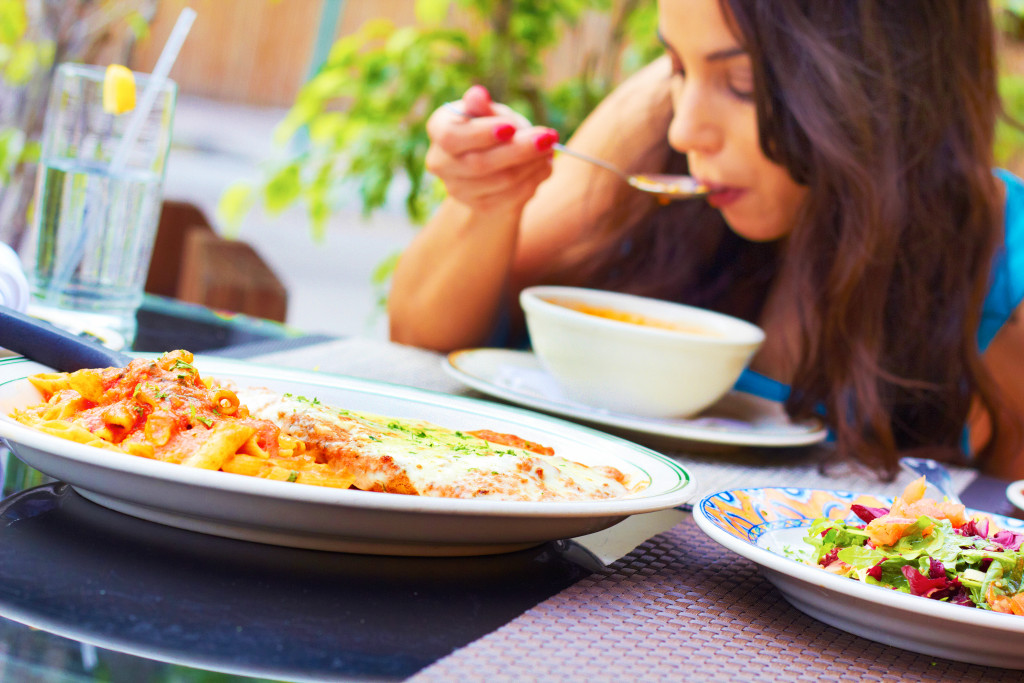Owing to the rise of fad diets and the bandwagon effect of various food trends on social media, our love-hate relationship with food ensues and becomes even more challenging.
The more that we follow food fads and trends, the more we lose our ability to see food as a form of nourishment and forget to really look into what we’re putting inside our bodies.
Aside from that, we might be eating food with undesirable side effects like bloating, indigestion, and more. There’s also the danger of consuming ingredients that trigger allergies later in life. This can cause weight gain and reactions you’re completely unprepared for.
Before jumping into any fad diet and food trend, let’s shift our focus to enjoying food and its mood-boosting power healthily and safely.
Observe Your Eating Habits
We all have our favorite food and snacks, and we enjoy eating them at any given time. Sometimes we go for seconds, and that’s fairly normal. However, consuming excessive amounts of food in a short time or continuing to consume more food past the point of feeling full can be a sign of binge eating.
Binge eating disorder (BED) is a life-threatening disorder. BED is characterized by a cyclical episode of consuming food in excessive amounts to the point of discomfort. If you or a loved one is suffering from BED, know that this disease is treatable can be prevented from recurring through a binge-eating disorder treatment plan. This includes nutrition counseling, psychotherapy, family and group therapy, and medication.
When patients get support, understanding, and proper BED treatment, they can overcome the habit of overeating and develop healthy eating habits during and well beyond their recovery stage.
Trust Your Gut

Food intolerance testing has become a thing, and many have gotten themselves tested at clinics or have been using home testing kits to find out which types of food they’re intolerant to. However, it’s worth mentioning that food intolerance is different from food allergies.
When it comes to food tolerance — or the lack of it — it’s best to listen to your body. If you feel bloated after eating a certain type of food, take note of it and do your own research. You might be able to eat certain food types in small quantities but not daily; your body might lack enzymes to digest certain food types altogether.
If this sounds like something you experience with some food you eat, consult a gastroenterologist. It will also help to keep a food diary and record side effects.
Go for Moderation
Contrary to popular belief, cutting out certain food types in your diet is the best way to develop healthy eating habits. Limiting your food options to certain food types can affect your daily nutrient intake and do you more harm than good.
Before you eliminate food groups and types in your diet, make sure you are fully aware of what you can and cannot eat regularly. This includes food that certain diet plans eliminate from their “healthy food list.”
In this case, it’s best to consult an allergy specialist. Consult a nutritionist to create a diet plan that helps you get proper nutrition daily and achieve your healthy eating goals.
Remember: You can enjoy any food that makes you feel good; the key is consuming food in moderation and finding a diet that works for you.
To develop a healthy relationship with food is to take care of your body the best way you can. More than the diet that you follow or the types of food that you love, it’s how you observe your eating habits and being honest about it with yourself.
If you are suffering from eating disorders, please know that help is there for you. If you plan to follow certain diet plans — be it scientifically proven or the current fad — make sure that it makes you feel healthier and better about yourself.
It’s also important to understand that you might feel like eating more sometimes and then eating less at other times. Both of these are normal, so don’t beat yourself up too much if you had an extra spoon of ice cream or another chunk of your favorite chocolate bar.
Ultimately, a healthy relationship with food is about having the freedom to eat the food you like without feeling guilty or bad about yourself afterward. So loosen up on the rules and feel free to eat when you’re hungry and stop when you’re full.
